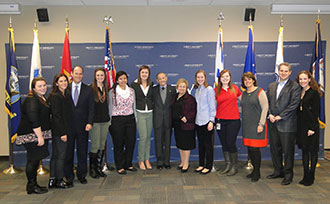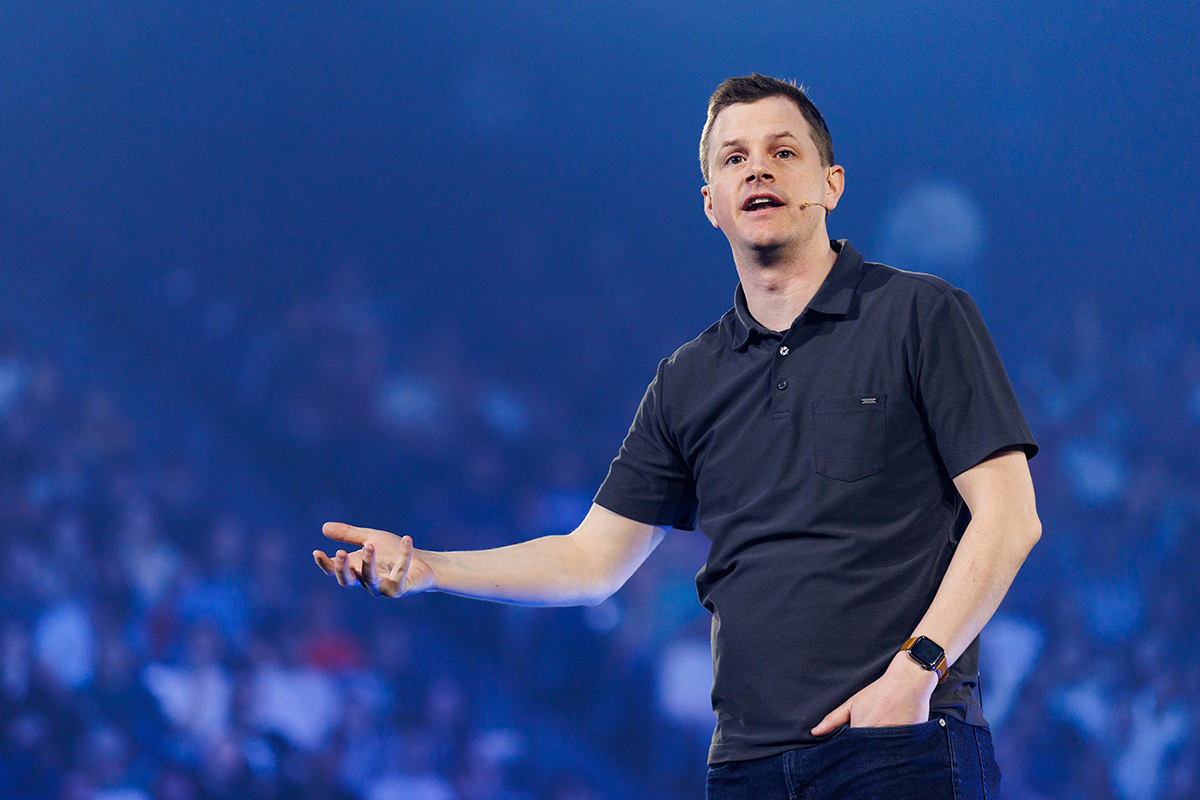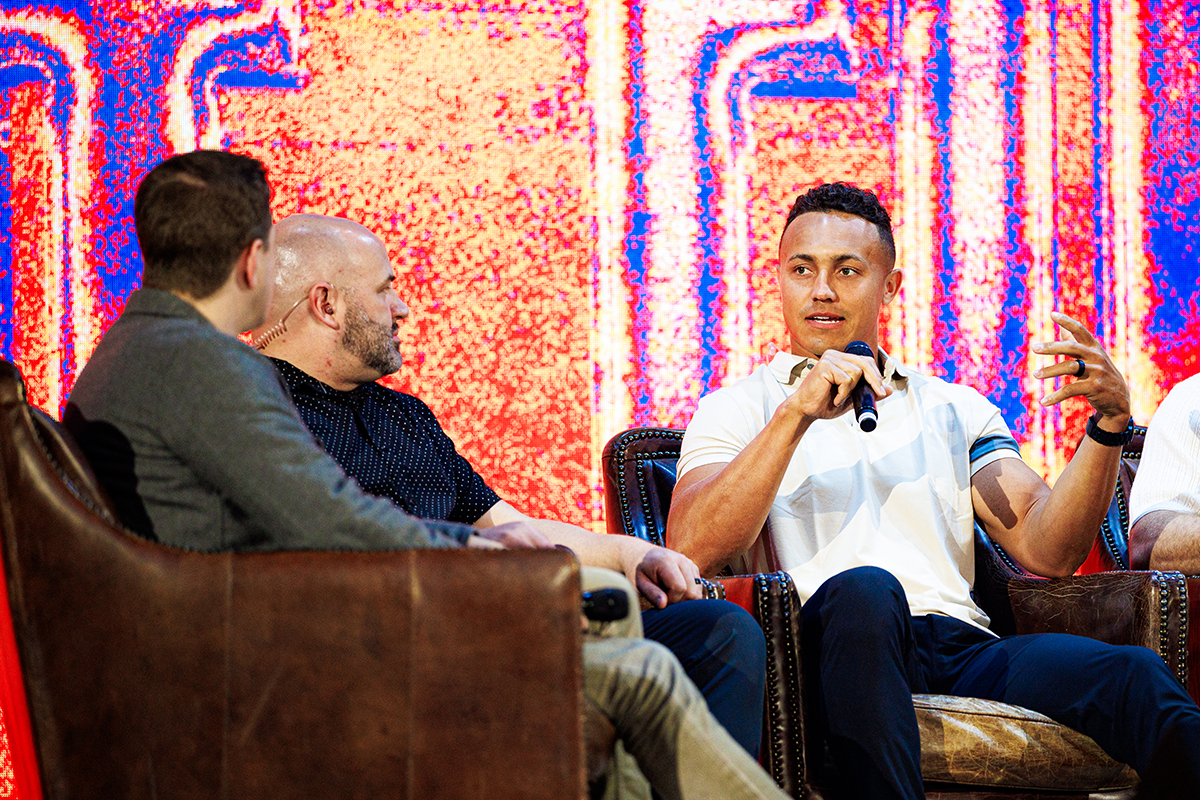Search News Archives
Filter News Articles
Additional Navigation
Students hear account of Holocaust through survivor’s eyes
November 17, 2014 : By Office of Communications & Public Engagement
As we look to the future, it is imperative that we never forget the lessons that history can teach us. This was the challenge issued to Liberty University students during Convocation on Monday as they heard the raw, unsettling account of Holocaust survivor Andrew Burian, who evaded certain death numerous times while held captive in a Nazi concentration camp.
Though there is no consolation for the horrors he has endured, Burian said that his faith in God has sustained him in life. His greatest earthly joys are his wife, three children, their spouses, as well as his 14 grandchildren and forthcoming great-grandchild. Family members joined him in Convocation on Monday.
Burian explained his love and appreciation for America, where he has lived since 1948.
“I am grateful to these United States, the greatest country in the world,” Burian said. “Her sons and daughters have liberated me. It is here where I built a home and live and prosper with my family in freedom and in safety.”
Burian said it took more than 50 years before he could begin to publicly share his story. He said he felt compelled to stand as a witness because the memory of the Holocaust and its atrocities has faded.
As a child of a large Czechoslovakian family with a thriving business, Burian explained how he experienced the slow, gradual changes in the way his people were treated. The terrors of the Holocaust did not sweep in overnight. Jews were first forced to register, then had to wear an identifying yellow star. Eventually, their homes and possessions were confiscated, and they were forced to live in ghettos where they were regularly robbed of what little they had left.
Then, in 1944, Burian and his family were sent to a train station. Burian vividly remembers his grandfather standing before the grave of his recently deceased wife and telling her that he would see her soon.
“He knew,” Burian recalled with chilling sobriety.
As a 13-year-old, Burian was funneled with his family and hoards of prisoners into Auschwitz-Birkenau, a combination concentration and extermination camp.
“Mere words cannot express the tumult,” Burian said. “The constant screams of children separated from their families, the constant commands, ‘Let’s go, let’s go.’ (Prisoners) forced at rifle point, bayonets, bursts of machine pistol fire, and dogs.”
It was the last time Burian ever saw his mother. He was with his father and brother for a short while, but they were eventually sent to another camp.
Burian recounted the terrible living conditions, where people were packed so tight that they could not get up while sleeping, even to remove those who died in the night. The dead would be rolled over the living in order to be disposed of. What little food they had was mixed with sawdust and garbage. People were constantly and systematically selected for extermination.
Burian described one especially brutal period: “The smoke stacks were spewing human ashes for more than a week while the open pyres lit the sky. There was no day, there was no night.”
Though Burian was chosen for execution multiple times, he managed to evade it over and over, due to either his wit or good fortune.
One of those times was when Allied forces advanced on the Nazis, and Burian was sent on a 56-mile death march. He nearly collapsed during the long, brutal winter journey.
“I learned what a mind and body can endure when there is a goal to be reached, when there is a perceived end of the suffering,” Burian said. “I have used this realization often. I made it my goal to survive and obey my father’s instruction to return home.”
During this trip, he and the other prisoners were lined up to be gunned down just before a messenger pulled the soldiers away for more pressing matters.
Burian eventually made it to another camp where he witnessed more atrocities, some too graphic to ever recount. But one day Burian noticed that the sentry posts had been abandoned, and American forces, some of them African-Americans, soon arrived. He said the invaluable role of African-American soldiers in the liberation of death-camp prisoners went overlooked for far too long.
Though the death camps claimed more than 70 members of his family, Burian was reunited with his father and brother while serving in a hospital shortly after being freed.
Today, Burian’s memoirs are being edited for publication in Jerusalem.
After sharing his story, Burian urged Liberty students to do more than simply remember — he said they must ensure others never forget as well.
“As I stand here today, I see young, vibrant, educated men and women. I see the future of this wonderful United States,” Burian said. “I feel compelled to ask you not to be complacent about the evil of discrimination or be tolerant of any form of prejudice and baseless hatred, regardless how cloaked or disguised. Be vigilant and take responsibility. It is your responsibility to learn the lessons of the past so that they are not repeated.”
The student body responded with a standing ovation.
Stand with Israel Club hosts Israel Emphasis events
 |
| Members of Liberty University’s Stand with Israel Club meet with the Burian family. |
After his Convocation message, Burian was honored with a lunch hosted by Liberty’s Stand with Israel Club. The lunch, featuring Burian and his family, began the club’s three-day Israel Emphasis event, Nov. 17-19.
On Tuesday, Nov. 18, the club held a briefing that highlighted the biblical reasons to support Israel. The event continued on Wednesday with the club’s fourth-annual Hanukkah Dinner featuring special guest speaker Victor Styrsky, the Eastern Regional Coordinator at Christians United for Israel (CUFI).
Liberty’s Stand with Israel Club received a special grant from the Israel on Campus Coalition to fund the events.


